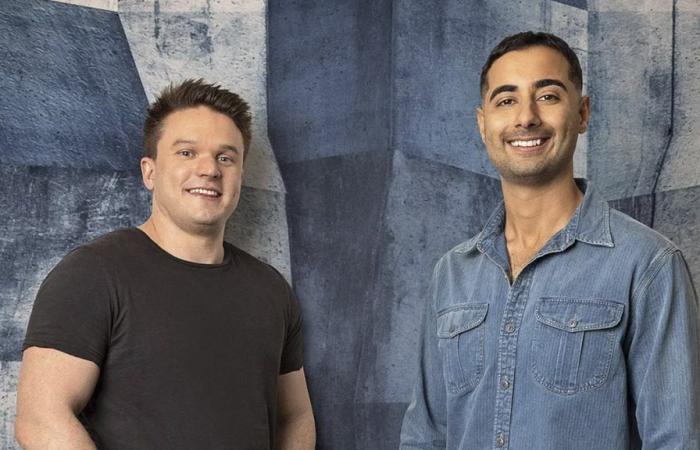It’s curious that Ed Craven and Bijan Tehrani met for the first time on the Internetwhere, as enterprising teenagers, they developed a way for players of Runescape, a video game on-line old school, they will bet on fights against each other using digital gold coins from the game. The system, called staking, was profitable, until, apparently, they were kicked off the platform. “I wouldn’t say they kicked us out,” says Craven, an Australian, with a sly smile. “But he certainly wasn’t seen very well by the game’s creators.”
Just over a decade later, Craven, 28, and Tehrani, 30, run Stake.com, the largest crypto casino offshore of the world. Stake generated $2.6 billion in revenue last year, even though the crypto game is not available in the United States, the United Kingdom and much of Europe. Their marketing instincts and willingness to operate in legal gray areas have made them two of the world’s youngest self-made billionaires, with an estimated fortune of $1.3 billion each.
Craven and Tehrani, who operate from Melbourne, Australia, have used their fortune to put the Stake name on Formula 1 cars, English Premier League jerseys, UFC octagons and a new live streaming service. But what they want most is legitimacy. And for this there is no price too high.
“We’ve taken two of the most controversial technologies and industries and combined them,” says Craven. “So it’s always been an uphill battle for us to overcome the public perception of what the company can represent.”
The duo began dabbling in cryptocurrencies in 2013., when bitcoin was trading around one hundred dollars. Together with some friends, They coded a primitive game called Primedice, which allows users to bet bitcoin on the roll of a virtual dice. Primedice generated enough profits to turn it into a full-time job for its teenage creators. His ambitions grew in spring 2016when They opened an office in Melbourne and founded their company, Easygo, with 18 employees.. Easygo launched Stake the following year, over time adding slots, table games and a sportsbook, with all bets in cryptocurrency.
They arrived at the right time. At the end of 2017, one bitcoin was worth more than $10,000 (currently it is over $60,000) and more and more people believed that it could be the future of money. “They weren’t really businessmen in those days; they were community leaders,” says Tim Heath, cryptocurrency pioneer and founder of Yolo, an Estonia-based crypto casino and venture investment firm. «Their income statements were probably done in Excel; “It’s not like a professional set.”
In that early period, crypto laws and regulations were virtually non-existent and casinos could obtain licenses in tax havens like Curacao, where Stake is licensed and taxes are minimal. Lack of oversight allowed Stake to keep costs low and offer players better odds. Players remained anonymous to the authorities and did not pay transaction fees.
The category grew in popularity even as a game review site on-line, Casinomeister, calls Curaçao a “laughable operator” for its lack of consumer protection, player verification, or anti-scam law enforcement. In January, Curaçao’s finance minister admitted what has long been known: the country has a reputation as a money laundering hub. “Look,” Heath says, “some shortcuts were taken in the beginning, no doubt about it.”
In search of young, risk-tolerant customers, Craven found a new generation of willing salespeople: content creators. Stake started paying some of them a million dollars a month or more to bet on the live streaming platform Twitch, often staking funds apparently provided by Stake. When pandemic lockdowns more than doubled Twitch’s viewership, “the operation exploded,” Craven says. 2022 saw a $100 million blockbuster with rap superstar and sports bettor Drake, giving Stake high visibility.
Between 2020 and 2022, Stake’s gross gaming revenue increased from around $100 million to over $2 billion, giving it a dominant share of the crypto casino market. The company, still self-financed and split 50/50 between Craven and Tehrani, obtained hundreds of millions of dollars in profits. The founders began to live like Rockefellers, literally. Tehrani bought a Manhattan townhouse owned by David Rockefeller for $47 million, and Craven bought two houses in Melbourne’s upscale Toorak neighborhood for a total of $76 million.
Both have also been willing to spend heavily on marketing. Stake is paying Twelve million dollars a year for the sponsorship of a Premier League football shirt English and one hundred million dollars in three years to become the naming rights sponsor of a Formula 1 team. “It’s not based on return on investment at all,” says Tehrani. “But I think when you have people’s attention, you should invest everything you can to keep it.”
Lately, their focus has been on protecting what they have built. More and more countries around the world have adopted –or are considering doing so– gambling laws on-lineincluding Curaçao, which leaves crypto casino operators facing a dilemma: continue to operate in a shrinking gray market or comply with regulations in as many countries as possible.
Stake has chosen the path of regulation, with a significant hiring of legal and compliance staff, strengthening its customer verification processes and opening regulated non-crypto operations in the United Kingdom, Portugal, Italy and Colombia. In the United States, Stake operates a “social casino” that runs on worthless digital currencies. This strategy will undoubtedly reduce its profitability, but Tehrani says that Stake is “starting to become a corporation” that could last for decades.
The duo is also branching out beyond gaming. At the end of 2022, Tehrani and Craven They used part of their Stake riches to launch Kick, a direct competitor to Twitch in live broadcasts. A few months earlier, Twitch had announced that it was banning Stake from advertising on its platform for lack of consumer protection. To counter this, Craven and Tehrani deployed Stake’s initial strategy of offering looser restrictions and maximum benefits to users to drive Kick’s growth. Once again, they attracted prominent creators to the platform with multimillion-dollar contracts and the possibility of streamers They will keep 95% of your subscription income, compared to 50% for Twitch. Kick has managed to make headlines, but its lax content moderation made it a home to controversial creators and illicit content, which complicated efforts to launch ads on the service.
This has led some to question the long-term viability of Kick. Forbes estimates that it operates with a deficit of several million dollars a month, losing more than one hundred million since its creation. Over the past decade, tech giants like Microsoft and Meta have tried and failed to create viable livestreaming, and even Twitch has never made a profit. In 2014, Amazon acquired Twitch for $862 million, but the price was largely for its live-streaming infrastructure, the same platform Kick now rents from Amazon Web Services.
Craven and Tehrani aren’t worried and say their emphasis remains on growth. In the fourth quarter of 2023, Kick’s market share was around 5%, according to the site Web Streams Charts analysis. “When we started Kick, our goal wasn’t to make money,” says Tehrani. “Ultimately, we are happy to personally invest large amounts of money in this business because we believe in it.”
All this is only possible thanks to the continued success of Stake and the profits that Craven and Tehrani obtained from their first bets on cryptocurrencies. Although both continue to claim to be crypto bulls, it is telling that they convert much of Stake’s revenue into various government-backed fiat currencies.
“Cryptocurrencies go up and down very quickly,” says Craven. «We don’t want to be exposed. “We are already in the gaming business, we don’t want to duplicate it.”
















